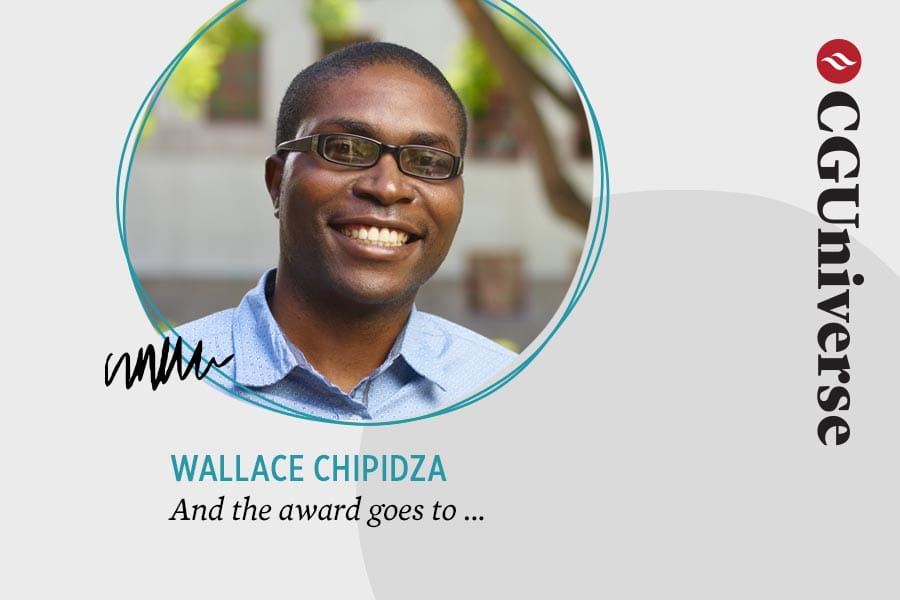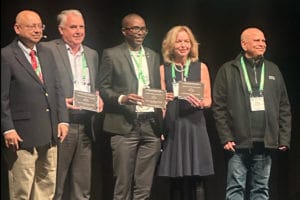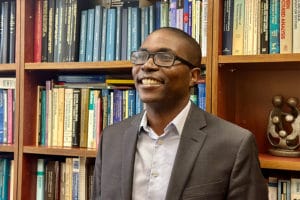CGUniverse: And the award goes to…

The annual International Conference on Information Systems (ICIS) is the most prestigious gathering of IS academics and research-oriented practitioners in the world.
— Association of Information Systems
It’s the Academy Awards for information systems, where the best minds and legends in the field come to honor the latest accomplishments and the rising stars. Amid the crowd in Copenhagen, an assistant professor from Claremont Graduate University sized up the experience.
“I’m a relatively young scholar, and I’m rubbing shoulders with these big, big names,” Wallace Chipidza says. “It’s like you’re right there next to Meryl Streep.”
Chipidza, who teaches and conducts research at the Center for Information Systems & Technology (CISAT), didn’t attend just to soak up the ambiance that evening in December. He was one of the honorees, recognized with two former colleagues from Baylor University for the AIS Best Publication Award. Among hundreds of research papers published in 2021 across all IS journals—a feat in itself considering the minute number of submissions that are accepted—theirs was judged among the best of the best.
And it almost never saw the light of day.

Chipidza earned his PhD at Baylor in 2018 with his dissertation The Network as Dependent Variable: Antecedents of Online Social Network Formation. Shortly thereafter, he reconnected at the ICIS conference with former colleagues Hope Koch and Timothy Kayworth. They told him they had a good paper on shadow analytics—maybe a really good paper—but they were struggling to articulate its contribution to theory. It had been rejected once already, and they didn’t want to risk another, so Koch asked Chipidza to join them in reworking it. Chipidza, who had provided some of the data during his studies, dived in, and the team submitted the paper to a different journal.
Rejected again.
“They said, ‘We see you are trying to revise, but we are not convinced. We are offering you a risky revision,’” Chipidza says, recalling the sobering email notification.
Risky revision is not a subtle term. If you swing and miss again, you’re out. Chipidza honed the theoretical basis. Koch and Kayworth reviewed the data. The Journal of Strategic Information Systems, one of the most prestigious in the field, publishes only 6.5 percent of the submissions it receives, and it receives hundreds annually.
“We worked really hard because this was a scary place to be,” Chipidza says. “To be rejected after multiple rounds of revision is a gut punch. But our work paid off. They accepted and published the paper. We celebrated and then more or less forgot about it.”
Last July, the journal notified them that its editorial board had judged the paper as its best of the year.
“We couldn’t believe it. We celebrated again.”
Among the hundreds of IS journals, the top 20 or so nominate their best papers for international recognition. A team of distinguished scholars score the papers and determine their contribution to the field. Four or five are selected.
“I was a doubting Thomas,” Chipidza says, but when the good news arrived in November, he rushed to get his visa and plane ticket to Denmark. And he, Koch, and Kayworth celebrated again.

Chipidza joined CGU’s faculty in 2018, fresh from his PhD.
“I didn’t know what to expect, but I met Lorne Olfmann [who retired last year] … and we became friends despite all the things that are different about us,” Chipidza says. “The collegiality of everyone at CISAT is really important. Because I feel at ease, I can do my best work.”
He models that same approach with his students, giving them extended time in the classroom to converse with each other rather than listen to long lectures. “You can trust students to be willing to learn and be willing to do research,” he says.
Some find it strange at first—Is this what grad school is supposed to be like?—and then it clicks.
“This is their space. This is where they can share their thoughts. They are free to be wrong, and that’s OK because others are there to offer helpful, respectful corrections,” Chipidza says. “Creating spaces where people can have spirited discussions about the material and learn from each other helps them to prepare way ahead of class. They have to be comfortable with it so that when they come to class they can contribute meaningfully.”
Like many of his faculty colleagues, Chipidza collaborates with students on research projects, including one during the pandemic that focused on government websites that provided information about Covid-19. And like many of his colleagues, he promotes students’ successes when they earn it.
“My student did such a good job that I was happy to say, ‘You are the first author.’ My colleagues all want students to get credit for the work they’ve done.”
The award-winning research paper about shadow analytics is not in Chipidza’s wheelhouse. In his first year of PhD work, he came across a concept called Graph Theory, in which mathematical structures are used to model relationships between objects. It’s a theory he applies to social networks—to people and their relationships with others.
“People have formal, organizational relationships, but informal relationships matter a lot: confiding networks—who gossips to whom—that when you examine them, you can see who has control and access to the newest flows of the information. I’m interested in digitally mediated interactions and their possible impacts.”
One of his research projects focused on turnover intention—identifying people, especially those in IT fields, who plan to leave their company. The real-world implications are serious because turnover is costly, both in lost expertise and the effort to identify and hire new talent.
“We think of who sent us an email and whether we need to respond, but we don’t often look at the big picture of who’s sending what to whom and what that might portend,” Chipidza says.
He and colleague John Tripp from Clemson University posited that individuals with high turnover intention engage less in work-related communications online, and when they do communicate online, it is with colleagues who are also thinking about leaving. They determined that companies would benefit by identifying these individuals and perhaps intervening in a positive way.
The results of their study, using exponential random graph modeling, supported their hypothesis.
Sometimes the inspiration for research comes from using social media the way the rest of us do: surfing Twitter and Reddit. Yes, Chipidza has a soft spot for funny videos, but he came across a disturbing pattern in the give-and-take of conversation online.
“I started to observe that there’s a certain meanness that you don’t see in the offline world. What are the incentives? Why are people doing this? When I encounter something exceptionally mean and cruel, I try to understand why. Why are so many people liking it? It’s the real world of human behavior.”
Is the online crudeness informing face-to-face interactions?
“That’s a good research question! It would be difficult to study because I would need to collect a lot of data and track it over time, but that’s a fascinating question.”
To learn more about Chipidza’s award-winning paper:
- Read this summary
- Read the full research paper